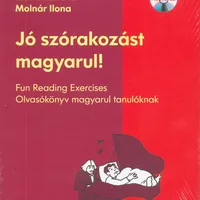Az el nem olvasott levél
The|not|not|read|letter
Nepřečtený dopis
Der ungelesene Brief
La carta no leída
La lettera non letta
De ongelezen brief
Непрочитаний лист
The unread letter
Először csináld meg a feladatot,
zuerst||||
First|do|it|the|task
|hazlo|hazlo||la tarea
Nejprve proveďte cvičení,
First, do the task,
majd utána hallgasd meg a szöveget.
then|after|listen|to it|the|text
luego|después de|escucharás|lo||el texto
a poté si poslechněte text.
then listen to the text.
A professzor, aki egy kertes házban lakott,
The|professor|who|a|with a garden|in a house|lived
||||con giardino||
|el profesor|que|una|con jardín|casa con jardín|vivía
Il professore, che abitava in una casa con giardino,
The professor, who lived in a house with a garden,
el akart utazni a vidéki nagynénjéhez.
er|||||
he|wanted|to travel|to|rural|aunt
||||rurale|dalla zia
||viajar||rural|su tía
voleva viaggiare dalla zia in campagna.
wanted to travel to his aunt in the countryside.
Mielőtt kiment a pályaudvarra,
bevor|||
Before|he went out|the|to the train station
prima di|è uscito||
Antes de|salió||a la estación
Před odchodem na stanici,
Bevor Sie zum Bahnhof gehen,
Prima di andare alla stazione ferroviaria,
Before he went out to the station,
összecsomagolt, és bezárta az ajtókat.
hatte gepackt||||
packed|and|locked|the|doors
ha imballato||ha chiuso||
sbalil a zavřel dveře.
packte zusammen und schloss die Türen.
ha fatto i bagagli e ha chiuso le porte.
he packed up and locked the doors.
Ahelyett, hogy szólt volna a szomszédjának,
anstatt|||||
Instead of|that|he/she had told|would have|the|to his/her neighbor
invece di||avesse parlato|avesse||del vicino
Místo toho, abyste to řekli sousedovi,
Anstatt es Ihrem Nachbarn zu sagen,
Instead of telling his neighbor,
hogy elutazik, bedobott egy levelet a postaládájába.
||warf||||
that|he/she travels away|he/she dropped|a|letter|the|into his/her mailbox
|partirà|ha messo||||nella sua cassetta postale
že odjíždí, vhodil do schránky dopis.
dass er verreisen würde, warf er einen Brief in seinen Briefkasten.
that he was traveling, he dropped a letter in their mailbox.
A levélben megkérte, hogy nézzen rá a házára,
The|in the letter|he asked|to|look|at it|the|house
|lettera|ha chiesto|||a lui||
In dem Brief hat er Sie gebeten, sich sein Haus anzusehen,
Nella lettera ha chiesto di dare un'occhiata alla sua casa,
In the letter, he asked them to check on his house,
és időnként locsolja meg a virágokat.
und|||||
and|occasionally|waters|them|the|flowers
|a volte|inna|||
und gießen Sie die Blumen von Zeit zu Zeit.
e di annaffiare di tanto in tanto i fiori.
and occasionally waters the flowers.
Mivel a szomszéd már két nappal azelőtt elutazott,
da|||||||
Since|the|neighbor|already|two|days|before|had left
poiché||||||prima|era partito
Denn der Nachbar war zwei Tage zuvor abgereist,
Poiché il vicino era partito già due giorni prima,
Since the neighbor left two days earlier,
nem kapta meg a levelet.
nicht|bekommen|||
did not|receive|the|the|letter
|ha ricevuto|||
no||||la carta
hat das Schreiben nicht erhalten.
he did not receive the letter.
A professzor tehát kiment a pályaudvarra,
The|professor|therefore|went out|the|to the train station
||quindi|||
|el profesor|por lo tanto|salió||a la estación
Also ging der Professor zum Bahnhof,
The professor then went to the train station,
és felszállt a vonatra.
und|||
and|boarded|the|train
|è salito||
él|subió||al tren
und bestiegen den Zug.
and boarded the train.
Miután egy kellemes hetet töltött a rokonainál, hazaindult.
nachdem|||||||
After|a|pleasant|week|spent|at|his relatives'|he set off home
dopo||piacevole||ha trascorso||dai parenti|
Después de|una|agradable|semana|pasó||los parientes|regresó a casa
Nachdem er eine angenehme Woche bei Verwandten verbracht hatte, fuhr er nach Hause.
Dopo aver trascorso una piacevole settimana dai parenti, partì per tornare a casa.
After spending a pleasant week with his relatives, he set off home.
Miközben szállt le a vonatról,
während||||
While|got|off|the|train
mentre|scendeva|||
Mientras|bajó|||del tren
Beim Aussteigen aus dem Zug,
Mentre scendeva dal treno,
As he was getting off the train,
már arra gondolt,
schon||
already|to that|thought
|a quello|
ya||pensó en
dachte er bereits,
già pensava a
he was already thinking about
milyen jó lesz az esti kártyaparti haverokkal.
wie||||||
how|good|will be|the|evening|card game|with friends
||sarà|||partita a carte|con gli amici
qué|buena|será|la|de la noche|juego de cartas|con amigos
wie schön es sein wird, am Abend mit Freunden eine Kartenparty zu feiern.
quanto sarà bello il party di carte stasera con gli amici.
how nice the evening card game with friends would be.
Mivel már nagyon türelmetlen volt,
da||||
Since|already|very|impatient|was
|||impaziente|
|ya|muy|impaciente|
Denn er war bereits sehr ungeduldig,
Poiché era già molto impaziente,
Since he was already very impatient,
taxiba ült, hogy minél előbb hazaérjen.
Taxi|||||
into the taxi|sat|so that|as soon as possible|earlier|he/she arrives home
|||il prima possibile|prima|torni a casa
en el taxi|sienta|para que|cuanto más|lo antes posible|llegar a casa
stieg er in ein Taxi, um so schnell wie möglich nach Hause zu kommen.
si è seduto in taxi per tornare a casa il prima possibile.
he got into a taxi to get home as soon as possible.
Amikor kiszállt a taxiból,
als|||
When|he/she got out|the|from the taxi
cuando|salió||del taxi
Als er aus dem Taxi ausstieg,
When he got out of the taxi,
döbbenetes látvány fogadta.
dörrendend||
astonishing|sight|greeted
d'incredibile|spettacolo|ha accolto
wurde von einem schockierenden Anblick begrüßt.
Una vista straordinaria mi ha accolto.
he was greeted by a shocking sight.
A ház előtt egy rendőrautó állt,
The|house|in front of|a|police car|was parked
Davanti alla casa c'era un'auto della polizia,
There was a police car in front of the house,
s a szomszédja éppen kézzel-lábbal magyarázott valamit a rendőröknek.
||Nachbar|||||||
and|the|neighbor|just|by hand|with his feet|was explaining|something|the|to the police officers
|||proprio|a mano|a piedi|stava spiegando|||
und sein Nachbar erklärte den Polizisten etwas mit seinen Händen und Füßen.
e il suo vicino stava proprio spiegando qualcosa ai poliziotti gesticolando.
and his neighbor was just explaining something to the police with gestures.
Mindkét ház ajtaja és ablakai tárva-nyítva voltak,
beide|||||||
Both|house|door|and|windows|open|open|were
Entrambe|||||aperta||
Die Türen und Fenster der beiden Häuser standen weit offen,
Both the doors and windows of the house were wide open,
a kert szeméttel és ismerős tárgyakkal volt tele,
the|garden|with trash|and|familiar|with objects|was|full
||di spazzatura||familiari|oggetti||pieno
|el jardín|||objetos familiares|||
Der Garten war mit Müll und vertrauten Gegenständen übersät,
il giardino era pieno di spazzatura e oggetti familiari,
the garden was filled with trash and familiar objects,
a virágok pedig hervadtan lógatták fejüket.
|Blumen||||
the|flowers|but|wilted|drooped|their heads
|||appassite|l'avevano appesa|la testa
und die Blumen ließen ihre Köpfe hängen und verwelkten.
i fiori invece pendevano con la testa appassita.
and the flowers were drooping their heads in withering.
SENT_CWT:AFkKFwvL=2.55 PAR_TRANS:gpt-4o-mini=1.84
en:AFkKFwvL
openai.2025-01-22
ai_request(all=34 err=0.00%) translation(all=28 err=0.00%) cwt(all=167 err=2.40%)

